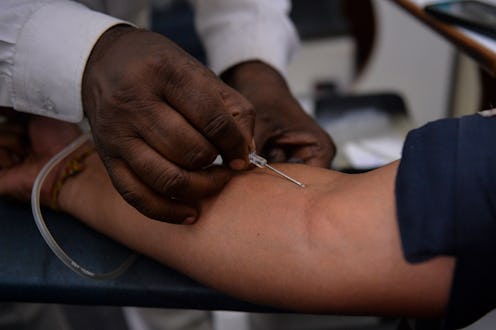News
Why Gay Men Can't Donate Blood
On June 12, 49 people lost their lives during a tragic shooting at Pulse, a gay nightclub in Orlando, Florida. An additional 53 people are injured and seeking medical care in hospitals in the area. Thousands of people have lined up to donate blood to the victims of the horrible shooting, but one specific population is unable to donate blood to their own community and the reasoning behind the policy has to do with sexual activity. Why can't gay men donate blood if they've had sex in the last year?
According to official FDA rules, gay and bisexual men are barred from donating blood if they've had sex in the last year with another man because a blood test might not find a recent transmission of the human immunodeficiency virus (HIV). Although the FDA revised its previously lifetime ban on gay and bisexual men having the option to donate blood in December 2015, many people feel that the fact that these individuals are not allowed to donate if they've engaged in sexual activities over the last 12 months is in itself a discriminatory policy.
The National Gay Blood Drive said in a statement, "While many gay and bisexual men will be eligible to donate their blood and help save lives under this 12-month deferral, countless more will continue to be banned solely on the basis of their sexual orientation and without medical or scientific reasoning."
In a Q&A on its website, the FDA explained its decision to get rid of its lifetime ban and change it to a 12-month ban, stating, "FDA expects that the changes made to the recommendations will maintain or improve blood safety with respect to HIV. The change with respect to [men who have had sex with other men] reflects current scientific evidence, and better aligns the deferral period with the deferral period for other men and women at increased risk for HIV infection."
Many people who are part of the LGBTQ+ community have expressed their concern and outrage over the policy, suggesting that it is still a discriminatory practice. Some have expressed outrage over the fact that queer men are unable to donate to their own partners, including Colorado Congressman Jared Polis.
The FDA's ban dates back to 1985, when the AIDS epidemic was first noticed in the U.S. and all queer men were banned from donating blood. However, though the policy's limit has been shortened to a time period that the FDA thinks is long enough to detect an infection, according to The Huffington Post, Whitman-Walker Health, an Washington D.C. LGBTQ community health center, has suggested that the waiting period doesn't have to be 12 months. This is especially due to the fact that HIV can be detected in a short period of time — "as little as nine days," according to The New York Times.
OneBlood, a blood center that services the state of Florida, posted a statement on Sunday noting "There is an urgent need for O Negative, O Positive and AB Plasma blood donors following a mass shooting in Orlando, Florida." You can help by donating at local blood donation centers.
